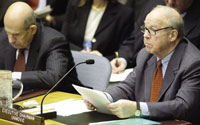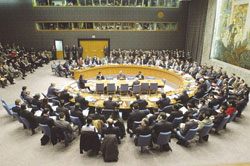
UN weapons inspectors to U.S.: ‘We need more time”
UNITED NATIONS (FinalCall.com)–In a much anticipated report on their findings in Iraq, the chief United Nations weapons inspectors were critical of Saddam Hussein’s cooperation in providing information about its programs for weapons of mass destruction but said they needed more time to come to a definitive conclusion.
Addressing the Security Council on Jan. 27, Dr. Hans Blix of the UN Monitoring, Verification and Inspection Commission (UNMOVIC) and Dr. Mohamed ElBaradei, director general of the International Atomic Energy Agency (IAEA), detailed the first 60 days of their inspections as authorized by Resolution 1441.
“The most important point to make is that access has been provided to all sites we have wanted to inspect and with one exception, it has been prompt,” Dr. Blix told the Council.
On the other hand, he told the Council that he was “bound to register some problems.” Those problems included refusal to guarantee safety for surveillance planes to gather aerial imagery and insisting on sending Iraqi helicopters into the U.S. and British patrolled “no-fly zone,” among other complaints.
“It is not enough to open doors,” he said. “Inspection is not a game of ‘catch as catch can.’”
While delivering news the United States did not want to hear–that there was no “smoking gun” reason to attack Iraq–Dr. Blix appeased U.S. hawks, saying, “Iraq appears not to have come to a genuine acceptance–not even today–of the disarmament which was demanded of it, and which it needs to carry out to win the confidence of the world and to live in peace.”

Mohamed ElBaradei was unambiguous in his assessment, telling the Council that to date the Agency had found no evidence that Iraq had revived its nuclear weapons program since the elimination of its program in the 1990s. He said the Agency’s work was steadily progressing and should be allowed to run its natural course.
“With our verification system now in place, barring exceptional circumstances, and provided there is sustained proactive cooperation by Iraq, we should be able, within the next few months, to provide credible assurance that Iraq has no nuclear weapons program,” he said. “These few months would be a valuable investment in peace because they could help us avoid a war.”
The report put the United States on the opposite side of fellow permanent members of the Security Council. France, Russia and China, each of whom has veto voting power, favor giving the weapons inspectors more time to complete their tasks.
“The inspection process is working and we want it to continue,” insisted the Chinese Ambassador Chen Guofang.
U.S. ambassador to the United Nations, John Negroponte, argued that Iraq has already been given plenty of time to comply with U.N. Security Council Resolution 1441, which obligates Iraq to cooperate with inspectors and give up all weapons of mass destruction or face “serious consequences.”
“How long is enough?” he asked. “How much time is enough for Iraq to come into compliance? This resolution has now been in effect for 80 days, and what has happened in that time? And, let’s remember one other point: The purpose of this exercise is not inspections, it is disarmament of Iraq,” he said.
Secretary of State Colin Powell–who favored the UN route in getting Iraq to comply with demands to destroy its weapons of mass destruction as opposed to a unilateral decision to attack Iraq proposed by Secretary of Defense Rumsfeld and others–voiced his disappointment at the weapons inspectors report from Capitol Hill.
“The list of unanswered questions and the many ways Iraq has been frustrating the work of the inspectors goes on and on,” he said. “Iraq’s refusal to disarm in compliance with Resolution 1441 still threatens international peace and security. And Iraq’s defiance continues to challenge the relevance and credibility of the Security Council.
“Even at this late date, the United States hopes for a peaceful solution. And a peaceful solution is possible only if Iraq disarms itself with the help of the inspectors. The issue is not how much more time the inspectors need to search in the dark. It is how much more time Iraq should be given to turn on the lights and to come clean. And the answer is not much more time. Iraq’s time for choosing peaceful disarmament is fast coming to an end,” he warned.
U.S. ally Britain kept up the attack through her representative.
“Time is running out for Iraq. We believe in disarmament through inspection, but Iraq is not cooperating,” said Ambassador Sir Jeremy Greenstock of the United Kingdom. “Resolution 1441 did not set us up for another decade of hide and seek.”
On the other hand, French ambassador to the UN, Jean-Marc de la-Sabliere, said the Council needs both, “more active cooperation from Iraq and we need more time. It could be several weeks, it could be a few months.”
As long as inspections are “producing results” he said, “they should go on,” he said. “There are no time limits in Resolution 1441. And, I remind that, according to Resolution 1441, at any time, Dr. Blix and Dr. ElBaradei can report to the council that it is of interest of Iraq to cooperate more actively,” he said.
Germany, which takes over the rotating presidency of the council from France next month, agrees that better and more active cooperation is needed. Germany would like to see another report from the inspectors to the Security Council next month.
Even UN Secretary General voiced caution: “They (weapons inspectors) should be given the time to do their work and all of us, the Council and the Assembly, must realize that time will be necessary, a reasonable amount of time, I’m not saying forever, but they do need time to get their work done and I suspect the council will allow that to be done.”












